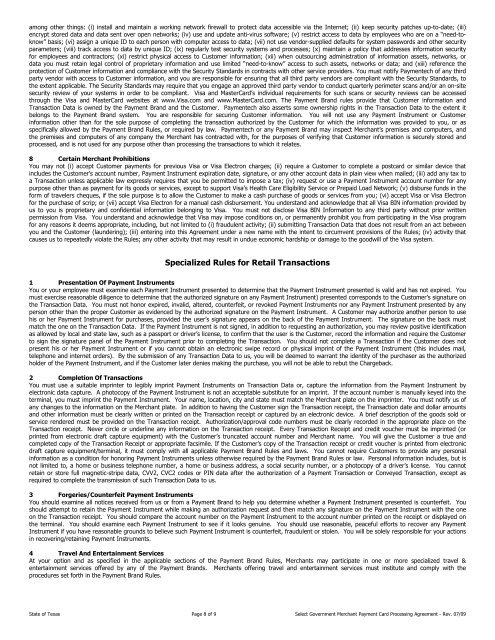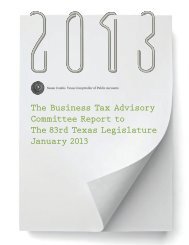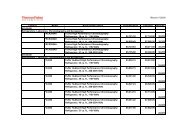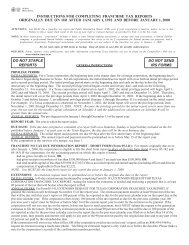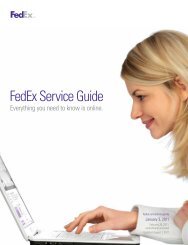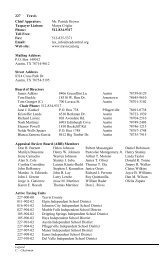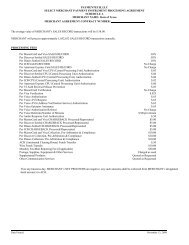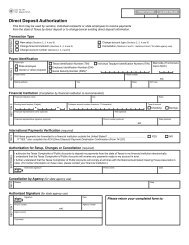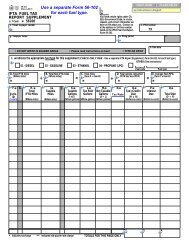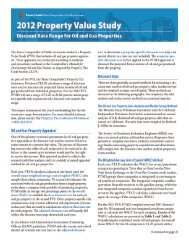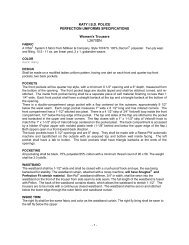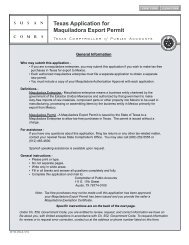(MasterCard and Visa) Merchant Agreement - Texas Comptroller of ...
(MasterCard and Visa) Merchant Agreement - Texas Comptroller of ...
(MasterCard and Visa) Merchant Agreement - Texas Comptroller of ...
Create successful ePaper yourself
Turn your PDF publications into a flip-book with our unique Google optimized e-Paper software.
among other things: (i) install <strong>and</strong> maintain a working network firewall to protect data accessible via the Internet; (ii) keep security patches up-to-date; (iii)encrypt stored data <strong>and</strong> data sent over open networks; (iv) use <strong>and</strong> update anti-virus s<strong>of</strong>tware; (v) restrict access to data by employees who are on a “need-toknow”basis; (vi) assign a unique ID to each person with computer access to data; (vii) not use vendor-supplied defaults for system passwords <strong>and</strong> other securityparameters; (viii) track access to data by unique ID; (ix) regularly test security systems <strong>and</strong> processes; (x) maintain a policy that addresses information securityfor employees <strong>and</strong> contractors; (xi) restrict physical access to Customer information; (xii) when outsourcing administration <strong>of</strong> information assets, networks, ordata you must retain legal control <strong>of</strong> proprietary information <strong>and</strong> use limited “need-to-know” access to such assets, networks or data; <strong>and</strong> (xiii) reference theprotection <strong>of</strong> Customer information <strong>and</strong> compliance with the Security St<strong>and</strong>ards in contracts with other service providers. You must notify Paymentech <strong>of</strong> any thirdparty vendor with access to Customer information, <strong>and</strong> you are responsible for ensuring that all third party vendors are compliant with the Security St<strong>and</strong>ards, tothe extent applicable. The Security St<strong>and</strong>ards may require that you engage an approved third party vendor to conduct quarterly perimeter scans <strong>and</strong>/or an on-sitesecurity review <strong>of</strong> your systems in order to be compliant. <strong>Visa</strong> <strong>and</strong> <strong>MasterCard</strong>’s individual requirements for such scans or security reviews can be accessedthrough the <strong>Visa</strong> <strong>and</strong> <strong>MasterCard</strong> websites at www.<strong>Visa</strong>.com <strong>and</strong> www.<strong>MasterCard</strong>.com. The Payment Br<strong>and</strong> rules provide that Customer information <strong>and</strong>Transaction Data is owned by the Payment Br<strong>and</strong> <strong>and</strong> the Customer. Paymentech also asserts some ownership rights in the Transaction Data to the extent itbelongs to the Payment Br<strong>and</strong> system. You are responsible for securing Customer information. You will not use any Payment Instrument or Customerinformation other than for the sole purpose <strong>of</strong> completing the transaction authorized by the Customer for which the information was provided to you, or asspecifically allowed by the Payment Br<strong>and</strong> Rules, or required by law. Paymentech or any Payment Br<strong>and</strong> may inspect <strong>Merchant</strong>’s premises <strong>and</strong> computers, <strong>and</strong>the premises <strong>and</strong> computers <strong>of</strong> any company the <strong>Merchant</strong> has contracted with, for the purposes <strong>of</strong> verifying that Customer information is securely stored <strong>and</strong>processed, <strong>and</strong> is not used for any purpose other than processing the transactions to which it relates.8 Certain <strong>Merchant</strong> ProhibitionsYou may not (i) accept Customer payments for previous <strong>Visa</strong> or <strong>Visa</strong> Electron charges; (ii) require a Customer to complete a postcard or similar device thatincludes the Customer’s account number, Payment Instrument expiration date, signature, or any other account data in plain view when mailed; (iii) add any tax toa Transaction unless applicable law expressly requires that you be permitted to impose a tax; (iv) request or use a Payment Instrument account number for anypurpose other than as payment for its goods or services, except to support <strong>Visa</strong>’s Health Care Eligibility Service or Prepaid Load Network; (v) disburse funds in theform <strong>of</strong> travelers cheques, if the sole purpose is to allow the Customer to make a cash purchase <strong>of</strong> goods or services from you; (vi) accept <strong>Visa</strong> or <strong>Visa</strong> Electronfor the purchase <strong>of</strong> scrip; or (vii) accept <strong>Visa</strong> Electron for a manual cash disbursement. You underst<strong>and</strong> <strong>and</strong> acknowledge that all <strong>Visa</strong> BIN information provided byus to you is proprietary <strong>and</strong> confidential information belonging to <strong>Visa</strong>. You must not disclose <strong>Visa</strong> BIN Information to any third party without prior writtenpermission from <strong>Visa</strong>. You underst<strong>and</strong> <strong>and</strong> acknowledge that <strong>Visa</strong> may impose conditions on, or permanently prohibit you from participating in the <strong>Visa</strong> programfor any reasons it deems appropriate, including, but not limited to (i) fraudulent activity; (ii) submitting Transaction Data that does not result from an act betweenyou <strong>and</strong> the Customer (laundering); (iii) entering into this <strong>Agreement</strong> under a new name with the intent to circumvent provisions <strong>of</strong> the Rules; (iv) activity thatcauses us to repeatedly violate the Rules; any other activity that may result in undue economic hardship or damage to the goodwill <strong>of</strong> the <strong>Visa</strong> system.Specialized Rules for Retail Transactions1 Presentation Of Payment InstrumentsYou or your employee must examine each Payment Instrument presented to determine that the Payment Instrument presented is valid <strong>and</strong> has not expired. Youmust exercise reasonable diligence to determine that the authorized signature on any Payment Instrument) presented corresponds to the Customer’s signature onthe Transaction Data. You must not honor expired, invalid, altered, counterfeit, or revoked Payment Instruments nor any Payment Instrument presented by anyperson other than the proper Customer as evidenced by the authorized signature on the Payment Instrument. A Customer may authorize another person to usehis or her Payment Instrument for purchases, provided the user’s signature appears on the back <strong>of</strong> the Payment Instrument. The signature on the back mustmatch the one on the Transaction Data. If the Payment Instrument is not signed, in addition to requesting an authorization, you may review positive identificationas allowed by local <strong>and</strong> state law, such as a passport or driver’s license, to confirm that the user is the Customer, record the information <strong>and</strong> require the Customerto sign the signature panel <strong>of</strong> the Payment Instrument prior to completing the Transaction. You should not complete a Transaction if the Customer does notpresent his or her Payment Instrument or if you cannot obtain an electronic swipe record or physical imprint <strong>of</strong> the Payment Instrument (this includes mail,telephone <strong>and</strong> internet orders). By the submission <strong>of</strong> any Transaction Data to us, you will be deemed to warrant the identity <strong>of</strong> the purchaser as the authorizedholder <strong>of</strong> the Payment Instrument, <strong>and</strong> if the Customer later denies making the purchase, you will not be able to rebut the Chargeback.2 Completion Of TransactionsYou must use a suitable imprinter to legibly imprint Payment Instruments on Transaction Data or, capture the information from the Payment Instrument byelectronic data capture. A photocopy <strong>of</strong> the Payment Instrument is not an acceptable substitute for an imprint. If the account number is manually keyed into theterminal, you must imprint the Payment Instrument. Your name, location, city <strong>and</strong> state must match the <strong>Merchant</strong> plate on the imprinter. You must notify us <strong>of</strong>any changes to the information on the <strong>Merchant</strong> plate. In addition to having the Customer sign the Transaction receipt, the Transaction date <strong>and</strong> dollar amounts<strong>and</strong> other information must be clearly written or printed on the Transaction receipt or captured by an electronic device. A brief description <strong>of</strong> the goods sold orservice rendered must be provided on the Transaction receipt. Authorization/approval code numbers must be clearly recorded in the appropriate place on theTransaction receipt. Never circle or underline any information on the Transaction receipt. Every Transaction Receipt <strong>and</strong> credit voucher must be imprinted (orprinted from electronic draft capture equipment) with the Customer’s truncated account number <strong>and</strong> <strong>Merchant</strong> name. You will give the Customer a true <strong>and</strong>completed copy <strong>of</strong> the Transaction Receipt or appropriate facsimile. If the Customer’s copy <strong>of</strong> the Transaction receipt or credit voucher is printed from electronicdraft capture equipment/terminal, it must comply with all applicable Payment Br<strong>and</strong> Rules <strong>and</strong> laws. You cannot require Customers to provide any personalinformation as a condition for honoring Payment Instruments unless otherwise required by the Payment Br<strong>and</strong> Rules or law. Personal information includes, but isnot limited to, a home or business telephone number, a home or business address, a social security number, or a photocopy <strong>of</strong> a driver’s license. You cannotretain or store full magnetic-stripe data, CVV2, CVC2 codes or PIN data after the authorization <strong>of</strong> a Payment Transaction or Conveyed Transaction, except asrequired to complete the transmission <strong>of</strong> such Transaction Data to us.3 Forgeries/Counterfeit Payment InstrumentsYou should examine all notices received from us or from a Payment Br<strong>and</strong> to help you determine whether a Payment Instrument presented is counterfeit. Youshould attempt to retain the Payment Instrument while making an authorization request <strong>and</strong> then match any signature on the Payment Instrument with the oneon the Transaction receipt. You should compare the account number on the Payment Instrument to the account number printed on the receipt or displayed onthe terminal. You should examine each Payment Instrument to see if it looks genuine. You should use reasonable, peaceful efforts to recover any PaymentInstrument if you have reasonable grounds to believe such Payment Instrument is counterfeit, fraudulent or stolen. You will be solely responsible for your actionsin recovering/retaining Payment Instruments.4 Travel And Entertainment ServicesAt your option <strong>and</strong> as specified in the applicable sections <strong>of</strong> the Payment Br<strong>and</strong> Rules, <strong>Merchant</strong>s may participate in one or more specialized travel &entertainment services <strong>of</strong>fered by any <strong>of</strong> the Payment Br<strong>and</strong>s. <strong>Merchant</strong>s <strong>of</strong>fering travel <strong>and</strong> entertainment services must institute <strong>and</strong> comply with theprocedures set forth in the Payment Br<strong>and</strong> Rules.State <strong>of</strong> <strong>Texas</strong> Page 8 <strong>of</strong> 9 Select Government <strong>Merchant</strong> Payment Card Processing <strong>Agreement</strong> - Rev. 07/09


